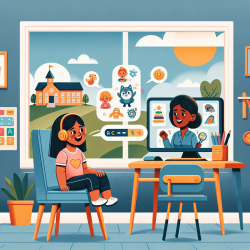The importance of addressing mental health and educational equity among Black adolescents cannot be overstated. The research article "Lift Every Voice: Engaging Black Adolescents in Social Justice Service-Learning to Promote Mental Health and Educational Equity" sheds light on the potential of service-learning (S-L) programs to bridge these gaps. This blog will explore key takeaways from the study and offer actionable insights for educators and practitioners.
Understanding the Research
The study focused on a 10-week summer program designed for Black middle school students. Conducted in a faith-based setting, the program aimed to close the achievement gap by integrating social justice themes into service-learning activities. The research highlighted several positive outcomes:
- Feasibility and Acceptability: The program was well-received by both staff and students, with high levels of engagement and satisfaction.
- Skill Development: Participants developed essential skills such as goal-setting, emotional regulation, and problem-solving.
- Perspective Shaping: The program inspired openness and a sense of inclusion among participants.
- Mental Health Benefits: There was a noticeable decrease in emotional symptoms and peer problems, alongside an increase in prosocial behaviors.
Implementing Service-Learning Programs
The success of this program offers valuable insights for educators looking to implement similar initiatives. Here are some practical steps to consider:
Create a Supportive Environment
A supportive environment is crucial for the success of service-learning programs. Engage community stakeholders, including parents, local organizations, and faith-based institutions, to create a network that supports students' growth.
Integrate Social Justice Themes
The integration of social justice themes is vital for fostering critical consciousness among students. Encourage discussions around societal inequities and empower students to explore solutions through service projects.
Cultivate Youth-Adult Partnerships
Youth-adult partnerships play a significant role in service-learning programs. Encourage collaboration between students and adults to promote mutual respect and shared decision-making.
Emphasize Reflection
Reflection is a key component of effective service-learning. Incorporate regular reflection sessions where students can discuss their experiences, challenges, and learnings.
The Role of Online Therapy Services
TinyEYE's online therapy services can complement service-learning programs by providing additional support for students' mental health needs. Our services offer flexible access to therapy sessions, ensuring that students receive the care they need when they need it.
The Path Forward
The findings from this research underscore the potential of service-learning programs to enhance mental health and educational equity among Black adolescents. By implementing these strategies, educators can create meaningful change in their communities.
If you're interested in learning more about this research and its implications, I encourage you to explore the original study: Lift Every Voice: Engaging Black Adolescents in Social Justice Service-Learning to Promote Mental Health and Educational Equity.










